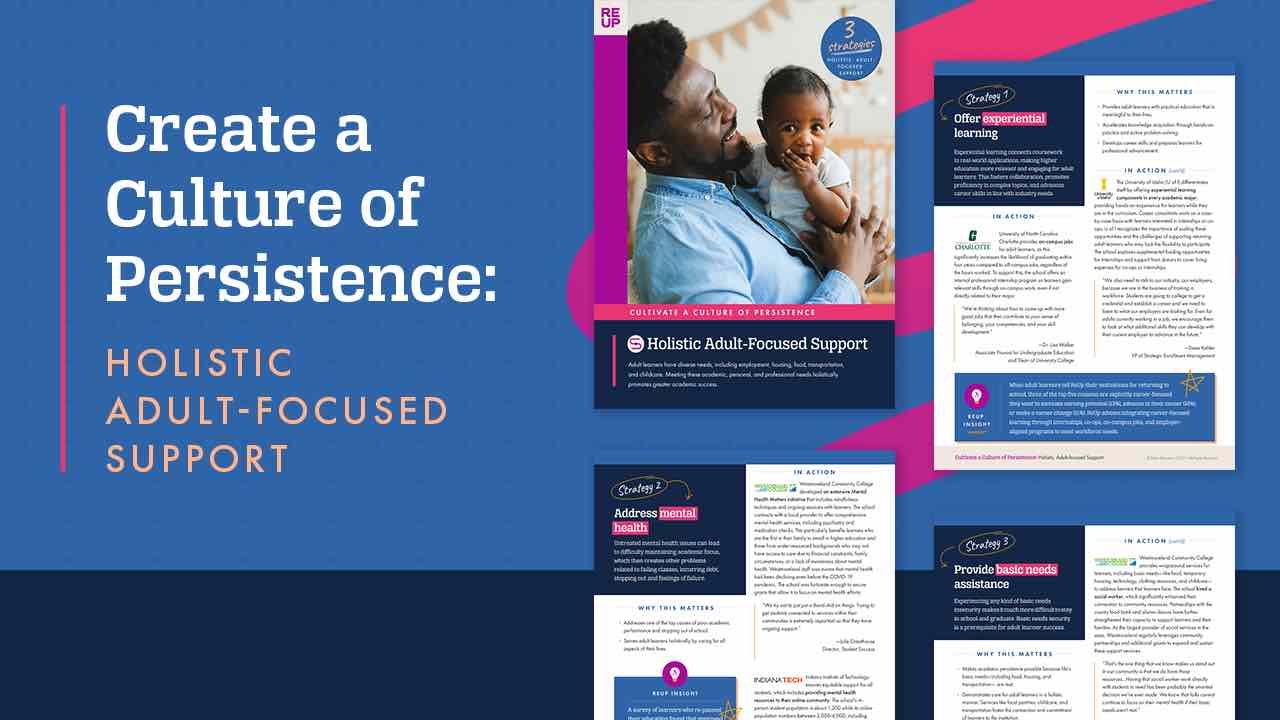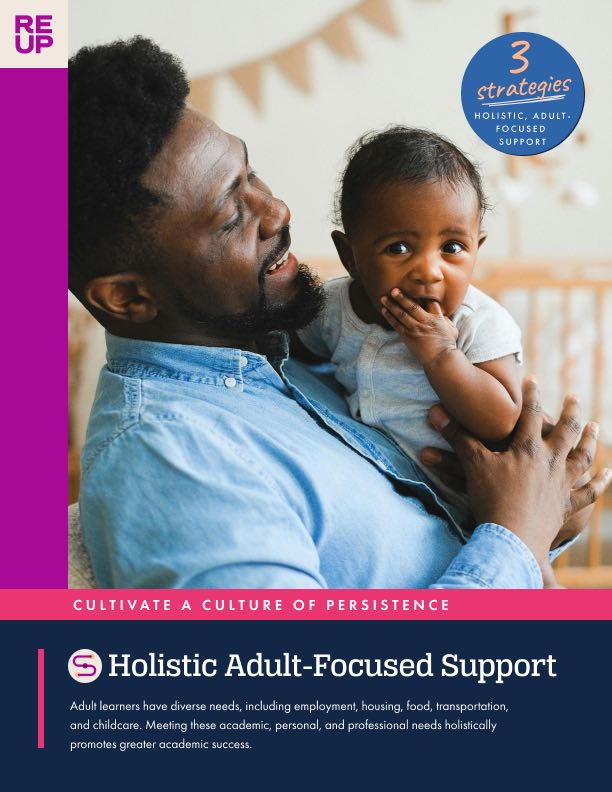Why Personalized Holistic Support Matters for Adult Learner Persistence

“When you feel seen and heard by a ReUp Coach, there’s an increased connection with the school that provided you this service at no cost to you, so it’s a big value-add to an institution.”
Persistence, in the context of adult education, means the ability to stay enrolled and engaged from one term to the next, ultimately progressing toward and achieving academic goals. However, this persistence is rarely fueled by determination alone. For many adult learners, success hinges on the support systems around them—both academic resources and solutions that address their broader needs. This is where holistic support comes into play.
From mental health and career planning to basic needs like childcare or housing, these interconnected elements make it possible for learners to thrive. This Q&A with ReUp Success Coaches, Ciarra and Shannon, dives into the real-life strategies and compassionate approaches our coaches use to meet adult learners’ unique needs.
What does holistic support mean in the context of adult learners, and why is it essential for fostering persistence and academic success?

Coach Ciarra: Holistic support nurtures the whole adult and ensures that all needs: emotional, social, financial, and the ability to manage time effectively, are met so the learner can thrive and succeed. It serves as the foundation of academic success, regardless of where a learner is in their journey, whether they are re-enrolling, working to persist through each term, or striving toward short-term or long-term goals.

Coach Shannon: Only one part of any adult learner is a student. The other areas of their lives help or hinder academic success, such as life balancing with work and now school, health and wellness, family obligations, and personal values. When folks can freely express themselves, accounting for all aspects of their life, they get more out of the discussion and can set goals for themselves with greater clarity and confidence.
Download “Creating a Culture of Persistence: Holistic Support, a free guide with practical tools, insights, and examples designed to drive persistence and success.
Mental health can have a profound impact on academic persistence. How does the coaching model ensure learners’ mental health needs are addressed, and what role does emotional support play in helping learners stay on track?

Coach Ciarra: The coaching model supports learners’ mental health by identifying concerns early through active listening and regular check-ins, and by offering appropriate resources when the learner is open to receiving them. While we’re not mental health professionals, coaches maintain a supportive presence and prioritize the learner’s well-being. Emotional support is a key part of coaching that helps build trust, normalize feelings, and keep learners engaged through challenges.

Coach Shannon: We recognize the courage it takes to ask for help and connect folks to resources directly as needed, both external and school-based support services. Coaches focus forward with the learner on goals for school, career, and education and clearly and distinctly set role boundaries that encourage learners to work with experts on any topic, including mental or emotional health and wellness.
Success coaching doesn’t just support academic needs but also builds confidence in learners. How do you foster a sense of empowerment in adult learners who might be returning to education after years away or experiencing self-doubt?

Coach Ciarra: By helping learners connect with their motivations and goals, we remind them of their “why,” which is a powerful anchor when their perseverance is tested. Often, learners move through life aware of what matters most to them, but they haven’t clearly identified these things as values. Naming and understanding their values can spark a deeper sense of purpose and motivation. Additionally, fostering a growth mindset is key, reminding them that their past experiences don’t define their future potential allows them to reframe setbacks and keep moving forward.

Coach Shannon: I believe my students are experts in themselves, so leveraging self-awareness on their knowledge, skills, and abilities provides a foundation. We then layer values, motivations, long and short-term goal setting on the foundation of transferable skills to create a success plan that’s really based on the individual’s sense of self and directly addresses doubt or fear to normalize and provide action steps and resources.
Can you share an example of how holistic support contributed to the success and persistence of an adult learner you worked with?

Coach Ciarra: A learner who’s preparing to graduate shared that biweekly meetings and ReUp were instrumental in overcoming challenges they felt they couldn’t have managed alone. Hearing other learners’ stories was a key motivator for their return to school.

Coach Shannon: I’m coaching a new learner who communicated she was feeling nervous in advance of her summer semester. Today, we discussed the challenges from her online college experience during the Covid pandemic. Through a thorough assessment we were able to drill down to the core obstacle, which for her was that she “felt unable to build relationships with her professors and classmates and felt a lack of a sense of community.” We were able to then create action items to solve for that as both her classes for her first semester back are 100% online.
Strengthen persistence with holistic support
Holistic support that goes beyond academics fosters persistence for adult learners. For actionable strategies, insights, and inspiring examples from institutions, download our guide, “Cultivate a Culture of Persistence: Holistic Support.”
Let’s start the conversation
Schedule a call with a ReUp team member to learn more about what a ReUp partnership could do for your institution.
